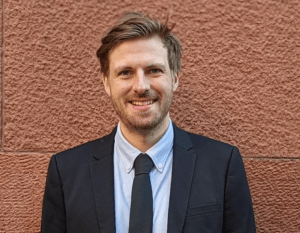CESS Experimental Economics Seminar
Location: Seminars will take place in-person at 19 W 4th Street, Room 517, 12:30-1:30
Upcoming Seminars
September 08 – Collin Raymond (Cornell University)
Title: “Incentive Complexity, Bounded Rationality and Effort Provision”
September 22 – Alistair Wilson (University of Pittsburgh)
Title: “Predicting Multiplayer Coordination in Repeated Games: Some Theory, Some Lab, Some AIs”
October 06 – Bill Zame (UCLA)
Title: “Do Decision Makers Have Subjective Probabilities? An Experimental Test”
October 20 – Eric Spurlino (NYU)
Title: “Rationally Inattentive and Strategically (un)Sophisticated: Theory and Experiment”
November 03 – Erkut Ozbay (U. of Maryland)
Title: “The Thrill of Gradual Learning”
November 17 – Colin Sullivan (Purdue University)
Title: “Eliciting Preferences over Life and Death: Experimental Evidence from Organ Transplantation”
Weekly Seminar: Colin Sullivan, “Eliciting Preferences over Life and Death: Experimental Evidence from Organ Transplantation”, Thursday, November 17, 2022
 Optimal allocation of life-saving medical treatment depends on society’s preferences over bundles of survival times. I experimentally elicit preferences over survival time distributions in incentivized, life-or-death decisions by having subjects allocate a real organ transplant among cats with kidney failure. Allocations in the experiment identify indifference curves over survival bundles. Most subjects value both total survival time and equality of survival times; few prefer to save the shortest-lived patient at all costs, despite the prevalence of this approach in allocating transplants in practice. Aversion to monetary inequality strongly predicts aversion to survival inequality.
Optimal allocation of life-saving medical treatment depends on society’s preferences over bundles of survival times. I experimentally elicit preferences over survival time distributions in incentivized, life-or-death decisions by having subjects allocate a real organ transplant among cats with kidney failure. Allocations in the experiment identify indifference curves over survival bundles. Most subjects value both total survival time and equality of survival times; few prefer to save the shortest-lived patient at all costs, despite the prevalence of this approach in allocating transplants in practice. Aversion to monetary inequality strongly predicts aversion to survival inequality.
Weekly Seminar: Erkut Ozbay, “The Thrill of Gradual Learning”, Thursday, November 3, 2022
 We report on an experiment that shows subjects prefer a gradual resolution of uncertainty when information about winning yields decisive bad news but inconclusive good news. This behavior is difficult to reconcile with existing theories of choice under uncertainty, including the Kreps-Porteus model. We show how the behavioral patterns uncovered by our experiment can be understood as arising from subjects’ special emphasis on their best (peak) and worst (trough) experiences along the realized path of uncertainty
We report on an experiment that shows subjects prefer a gradual resolution of uncertainty when information about winning yields decisive bad news but inconclusive good news. This behavior is difficult to reconcile with existing theories of choice under uncertainty, including the Kreps-Porteus model. We show how the behavioral patterns uncovered by our experiment can be understood as arising from subjects’ special emphasis on their best (peak) and worst (trough) experiences along the realized path of uncertainty
Weekly Seminar: Eric Spurlino Rationally Inattentive and Strategically (un)Sophisticated: Theory and Experiment, Thursday, October 20, 2022
 In games with costly information acquisition, the ability of one player to acquire information directly affects her opponent’s incentives of gathering information. Rational inattention theory posits that the opponent’s information acquisition strategy is a direct function of these incentives. This paper argues that people are cognitively limited in predicting their opponent’s level of information and hence lack the strategic sophistication that theory assumes. Using an experiment involving a real effort attention task and a simple two player trading game, I study the ability of subjects to (1) anticipate the information acquisition of opponents in this strategic game, and (2) best respond when acquiring their own costly information. The above is studied by exogenously manipulating the difficulty of the attention task for both the player and their opponent. Predictions of behavior are generated by a novel theoretical model in which Level-K agents can acquire information a la rational inattention. The findings are an outsized lack of strategic sophistication, driven largely by the cognitive difficulties of predicting opponent information. These results suggest a necessary integration of the theories of rational inattention and cognitive uncertainty in strategic settings.
In games with costly information acquisition, the ability of one player to acquire information directly affects her opponent’s incentives of gathering information. Rational inattention theory posits that the opponent’s information acquisition strategy is a direct function of these incentives. This paper argues that people are cognitively limited in predicting their opponent’s level of information and hence lack the strategic sophistication that theory assumes. Using an experiment involving a real effort attention task and a simple two player trading game, I study the ability of subjects to (1) anticipate the information acquisition of opponents in this strategic game, and (2) best respond when acquiring their own costly information. The above is studied by exogenously manipulating the difficulty of the attention task for both the player and their opponent. Predictions of behavior are generated by a novel theoretical model in which Level-K agents can acquire information a la rational inattention. The findings are an outsized lack of strategic sophistication, driven largely by the cognitive difficulties of predicting opponent information. These results suggest a necessary integration of the theories of rational inattention and cognitive uncertainty in strategic settings.
Weekly Seminar: William Zame, “Do Decision Makers Have Subjective Probabilities? An Experimental Test”, Thursday, October 6, 2022
 Anscombe & Aumann (1963)s offer a definition of subjective probability in terms of comparisons with objective probabilities. That definition — which has provided the basis for much of the succeeding work on subjective probability — presumes that the subjective probability of an event is independent of the prize consequences of that event, a property we term Prize Independence. We design experiments to test Prize Independence and find that a large fraction of our subjects violate it; thus, they do not have subjective probabilities. These findings raise questions about the empirical relevance of much of the literature on subjective probability.
Anscombe & Aumann (1963)s offer a definition of subjective probability in terms of comparisons with objective probabilities. That definition — which has provided the basis for much of the succeeding work on subjective probability — presumes that the subjective probability of an event is independent of the prize consequences of that event, a property we term Prize Independence. We design experiments to test Prize Independence and find that a large fraction of our subjects violate it; thus, they do not have subjective probabilities. These findings raise questions about the empirical relevance of much of the literature on subjective probability.
Weekly Seminar: Alistair Wilson, “Predicting Multiplayer Coordination in Repeated Games: Some Theory, Some Lab, Some AIs”, Thursday, September 22, 2022
 In ongoing relationships where both the collusive and non-collusive outcomes can be supported as equilibria, researchers must resolve underlying selection questions for a theoretical understanding of counterfactual policies. One theoretical guide to selection has shown promise in predicting when collusive outcomes will emerge in simple two-player repeated-game experiments. In this paper we both expand upon and experimentally test this model of selection and its underlying mechanism (strategic uncertainty). Expanding the environment to allow for an arbitrary number of participants, we stress test the model. Our results affirm the selection model as a tool for predicting when tacit collusion is likely/unlikely. In a complementary exercise, we then show that the model also predicts the collusive behavior of a standard AI agent (with a learning algorithm typical for pricing tasks), though there is some sensitivity to the form of the learning. As such, our paper serves to further bolster strategic uncertainty as a device for modeling and understanding equilibrium selection, but also the use of AI agents as a predictive tool for designing and stress-testing experiments on human subjects.
In ongoing relationships where both the collusive and non-collusive outcomes can be supported as equilibria, researchers must resolve underlying selection questions for a theoretical understanding of counterfactual policies. One theoretical guide to selection has shown promise in predicting when collusive outcomes will emerge in simple two-player repeated-game experiments. In this paper we both expand upon and experimentally test this model of selection and its underlying mechanism (strategic uncertainty). Expanding the environment to allow for an arbitrary number of participants, we stress test the model. Our results affirm the selection model as a tool for predicting when tacit collusion is likely/unlikely. In a complementary exercise, we then show that the model also predicts the collusive behavior of a standard AI agent (with a learning algorithm typical for pricing tasks), though there is some sensitivity to the form of the learning. As such, our paper serves to further bolster strategic uncertainty as a device for modeling and understanding equilibrium selection, but also the use of AI agents as a predictive tool for designing and stress-testing experiments on human subjects.
Weekly Seminar: Collin Raymond, “Incentive Complexity, Bounded Rationality and Effort Provision”, Thursday, September 8, 2022
 This paper shows that dynamic incentives in a workplace incentive scheme can be a shrouded attribute, due to contract complexity and worker bounded rationality. Field experiments in a firm find a weak response to dynamic incentives. A structural model with fully rational workers predicts a much stronger response, even accounting for other factors that might matter for worker responses. Online experiments with the same workers exclude such alternative factors by design, and again find a weak response, unless the scheme is simplified, or workers have high cognitive ability. Understanding online also predicts responding in the field experiments. Additional experiments with AMT workers replicate the results, and shed further light on mechanisms. The results (i) demonstrate that complexity affects effort provision and may allow firms to achieve better than second- best; (ii) show that incentive effects may depend on cognitive ability; (iii) shed light on mechanisms underlying complexity; and (iv) offer guidance for incentive design.
This paper shows that dynamic incentives in a workplace incentive scheme can be a shrouded attribute, due to contract complexity and worker bounded rationality. Field experiments in a firm find a weak response to dynamic incentives. A structural model with fully rational workers predicts a much stronger response, even accounting for other factors that might matter for worker responses. Online experiments with the same workers exclude such alternative factors by design, and again find a weak response, unless the scheme is simplified, or workers have high cognitive ability. Understanding online also predicts responding in the field experiments. Additional experiments with AMT workers replicate the results, and shed further light on mechanisms. The results (i) demonstrate that complexity affects effort provision and may allow firms to achieve better than second- best; (ii) show that incentive effects may depend on cognitive ability; (iii) shed light on mechanisms underlying complexity; and (iv) offer guidance for incentive design.